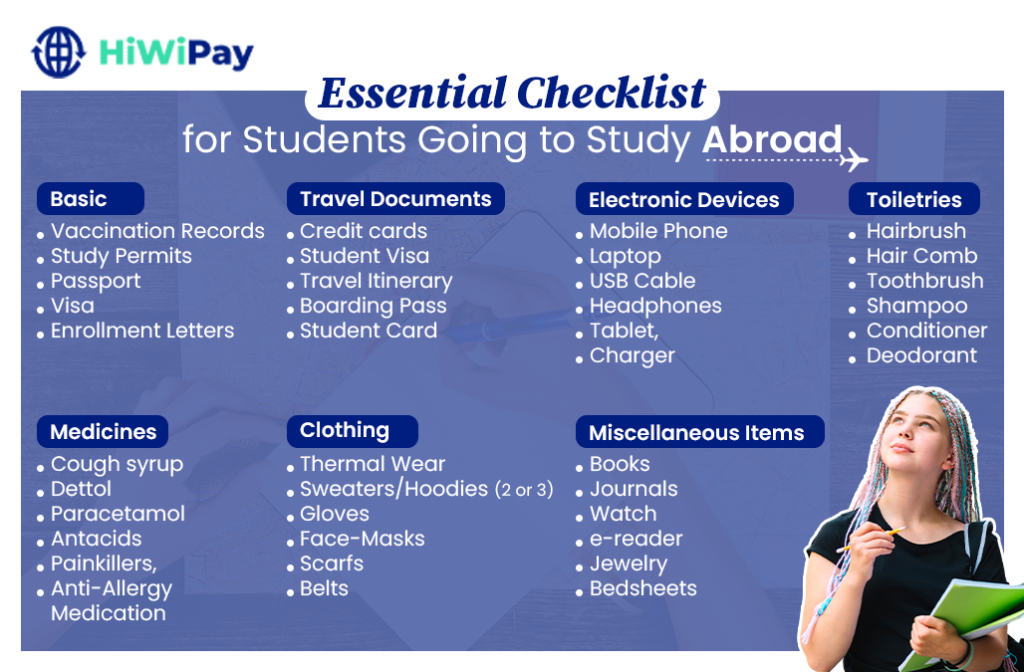Read on for Our Study Abroad Checklist Essentials
As you prepare for your upcoming travel, it is essential to ensure you have all the necessary documents in order to avoid any last-minute hassles. Don’t forget to bring your vaccination records, study permits, passport, visa, enrollment letters, and any other travel documents you might need.
Here are all the Essentials for Students Going to Study Abroad:

Travel Documents
Travel documents are indispensable for students studying abroad. They serve as the key to not only flying and boarding the plane but also for passing through immigration check-ins and completing post-departure formalities.
Here’s the list of travel documents you must have with you:
- Passport
- Student Visa
- Credit cards
- Travel Itinerary
- Boarding Pass
- Student Card
- Health insurance card or copy of travel health insurance
- Fee receipt for accommodation allotted
Remember to keep them safe and always carry a physical and digital copy of all your essential documents so you are not left hanging in case they get lost.
International Student Identity Card (ISIC)
Always keep your ISIC card with you. The ISIC is more than just a piece of plastic; it is your passport to a world of discounts and benefits tailored specifically for students like you. You can get discounts on various products and services, including public transportation, travel insurance, international calling cards, phone repairs, and Segway tours.
So, how do you get your hands on this invaluable card? It is simple.
- Go to ISIC’s website.
- Ensure you meet the eligibility criteria for the ISIC card, which usually requires being a full-time student.
- Fill out the application form on the ISIC website.
- Submit the required documents. All you need is proof of your university enrollment, acceptance letter, program verification, and a few other essential documents, such as your housing contract, proof of medical and travel insurance, and health records, including copies of medical records and vaccination certificates.
- Submit the application.
Remember to start the application process early as it takes 3-4 weeks to process. Try to get the card before you leave India. If you miss the chance to get the card while in India, you can still apply for it after arriving at your study destination abroad.
Foreign Currency
Make sure to have some cash in the currency of the country you are going to study in. This will come in handy for things like buying small items or dealing with unexpected situations when you first arrive. Before you leave, take some time to learn about the local currency and check the exchange rate. Think about how much cash you will need for your first few days. Keep an eye out for any fees when you exchange your money, and look for the best place to do it to get the most value. If you forget or are short on cash once you arrive, then don’t worry; HiWiPay has your back. We can help you transfer money abroad at the lowest markup fee imaginable within 24 hours. Visit our website or download the app today.
Forex Card
A Forex or travel card, also known as a prepaid travel card, is an excellent choice for international travelers. Many banks, like ICICI, HDFC, etc., offer forex cards. It is a secure way to manage foreign currency while abroad. You load it with a chosen currency before your trip, locking in the exchange rate for peace of mind. This way, you even protect yourself from exchange rate fluctuations. The best part? There are no fees for transferring money, though there are small charges for ATM withdrawals.
Electronic Devices
Electronic devices are undoubtedly essential for travel. Phones, laptops, headphones, and tablets are essential companions. However, a universal adapter is an indispensable item to add to the mix. The thing is, different countries have different outlets, so it is wise to buy one before your trip. Here’s a list of other important electric gadgets to pack:
- Mobile phone
- Laptop
- USB cable
- Headphones
- Tablet
- Charger
- Any other daily essentials.
Toiletries
As mentioned above, different countries have different outlets, so avoid packing hair styling gadgets in your carry-on bag, as they tend to use a lot of power. Instead, you can carry on your essentials:
- Hairbrush
- Hair comb
- Toothbrush
- Shampoo
- Conditioner
- Deodorant
- Make-up
- Shaving supplies
- Nail clippers
- Contact lenses
- Tissues
- Razors
- Mask
- Hand sanitizer
- Toothpaste
- Face wash
Medicines
If you are going to study abroad, you should always have certain medicines handy, even if you are not undergoing some treatment, to treat the common cold, headaches, or stomachache. If you are undergoing some treatment, then remember to bring enough of your prescribed medication along with the doctor’s prescription.
Here are some of the medicines you can pack:
- Cough syrup
- Dettol
- Paracetamol
- Antacids
- Painkillers
- Anti-allergy medication
- Antiseptic
- Bandages
Remember to check the regulations regarding medication in your destination country, as some medicines that are over-the-counter in India might require a prescription elsewhere or may even be prohibited.
Clothing
Packing appropriate clothing is crucial for a comfortable study abroad experience, especially in colder climates. Research the weather and culture of your destination country to pack accordingly. For colder countries like the USA and Canada, bring warm clothes, while for warmer climates like in East Asia and Africa, pack lighter clothing.
Although there’s no specific packing list for Indian students going abroad, here are some essential items to consider:
- Thermal Wear
- Sweaters/Hoodies (2 or 3)
- Touch-Screen Friendly Gloves
- Face-Masks
- Footwear like flip-flops for casual wear, running shoes for exercise, and socks, and boots or heels for special occasions.
- Scarfs
- Gym Wear/Sportswear
- Belts
- Business Suit
- Winter coats
- Rain gear
- Casual clothes like jeans, T-shirts, etc.
Remember, it is also a good idea to leave some space in your luggage for any clothing you may wish to purchase abroad.
Miscellaneous Items to Pack
Optional items for students to consider bringing include:
- Books
- Journals
- Watch
- e-reader
- Jewelry
- Bedsheets
- Pillows
- Flash drive
- Sleeping bag
- Camera
- School supplies
- Purse
- Backpack
- Headphones
- Towel
- Water bottle
- Sunglasses
What Not to Pack for Study Abroad
When packing for your study abroad adventure, it’s important to be mindful of what not to bring to avoid unnecessary hassle and expenses. Here’s what not to pack for your study abroad journey:
- Lots of Food or Snacks: While it is tempting to bring your favorite snacks from home, packing heaps of food can take up valuable space in your luggage and may not be allowed through customs.
- Books: Packing a stack of books might seem like a good idea for downtime, but they can add unnecessary weight to your luggage. Opt for e-books or utilize libraries and bookstores at your destination to satisfy your literary cravings.
- Valuables & Luxury Items: It is best to leave expensive jewelry, designer bags, and other valuables at home to avoid the risk of theft or loss.
- Bedding: While having familiar bedding might provide comfort, it is often bulky and impractical to bring along. Most accommodations abroad provide bedding.
- Tons of Electronic Appliances: They will only take up space and add weight to your luggage.
Remember, packing light and smart can save you from potential issues at customs and make your travel more comfortable.
Read More – How to Get Student Loan for MBA Abroad
Packing Hacks
Packing efficiently for your study abroad experience can make a significant difference in your travel comfort and mobility. Here are some tried-and-true packing hacks:
- Roll, Don’t Fold: Rolling your clothes instead of folding them can save space and reduce wrinkles. You will also find this method easy to do.
- Wrap Shower Caps Around Your Shoes: You can keep your clothes and other items in the luggage safe and clean by wrapping shower caps around your shoes.
- Binder Clips: These can help you organise the cords of your headphones or other small items, preventing them from getting tangled with each other.
- Leak-Proof Containers for Liquids: To avoid spills, transfer your shampoos, lotions, and other liquids into reusable leak-proof containers. This not only saves space but also ensures you comply with airline regulations for carry-on liquids.
- Smaller Bags: By using these, your focus will remain on packing the essentials. It will also be easier to carry and manage.
- Wear Bulky Items: To save space in your luggage, wear heavier clothes like jackets, sweaters, and boots on the plane. This approach also prepares you for varying temperatures during your journey.
These hacks are designed to maximize your luggage space and minimize hassle, allowing you to focus on the excitement of your study abroad adventure rather than the stress of over packed bags. Remember, the goal is to pack smart, not necessarily light, ensuring you have everything.
FAQS on Essential Checklist for Students Going to Study Abroad
Do I Need to Take up TOEFL Mandatory?
The requirement to take the TOEFL (Test of English as a Foreign Language) exam depends on the specific requirements of the university and program you are applying to. While TOEFL is a widely recognized English proficiency test, it is not mandatory for all institutions or countries; some may accept tests like the IELTS (International English Language Testing System). You must check directly with the university or program to which you are applying to understand their specific requirements.
How do I find a good education loan with a low interest rate for studying abroad?
Finding a good education loan with a low-interest rate for studying abroad involves researching and comparing various loan options. Here are some steps to help you find a suitable education loan:
1. Research online
2. Compare interest rates
3. Check the loan’s features
4. Look for subsidies and benefits offered by the government
5. Consult with banks to get personalised advice
6. Seek professional advice
References:
Works Cited
“Essential Checklist for Students Going to Study Abroad.” Unimoni, 22 June 2023, www.unimoni.in/blog/essential-checklist-for-students-going-to-study-abroad/ Accessed 22 Apr. 2024.
“ISIC.” ISIC, 2019, www.isic.org/. Accessed 22 Apr. 2024.
Monaco, Emily. “The Ultimate Study Abroad Packing Guide | Go Overseas.” Www.gooverseas.com, 25 Aug. 2021, www.gooverseas.com/blog/study-abroad-packing-list. Accessed 22 Apr. 2024.
Sharma, Bulbul. “Packing List for Indian Students Going Abroad PDF – Checklist 2024-2025.” Upgrad Abroad, 21 Mar. 2024, www.upgradabroad.com/articles/packing-list-for-indian-students-going-abroad/. Accessed 22 Apr. 2024.








